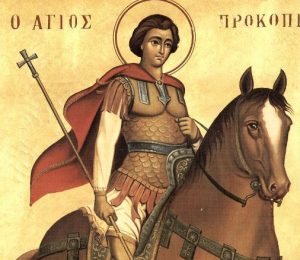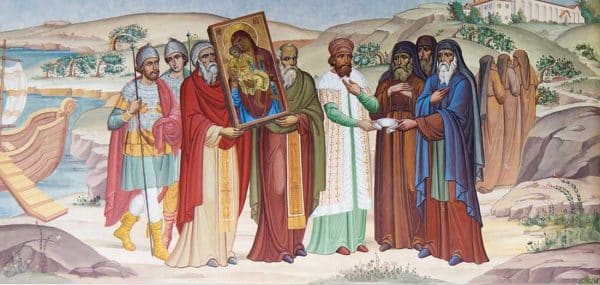The life of Saint Prokopios
 Saint Prokopios, venerated in the Eastern Orthodox, Oriental Orthodox, and Eastern Catholic Churches, is one of the early Christian martyrs whose life and acts exemplify steadfast faith in the face of persecution. Born in Jerusalem during the 3rd century AD, Prokopios is celebrated for his conversion to Christianity, his zealous preaching, and ultimately his martyrdom under the Roman Empire’s anti-Christian edicts. His story, rich with themes of conversion, bravery, and divine intervention, offers a glimpse into the challenges faced by early Christians and their unwavering commitment to their faith.
Saint Prokopios, venerated in the Eastern Orthodox, Oriental Orthodox, and Eastern Catholic Churches, is one of the early Christian martyrs whose life and acts exemplify steadfast faith in the face of persecution. Born in Jerusalem during the 3rd century AD, Prokopios is celebrated for his conversion to Christianity, his zealous preaching, and ultimately his martyrdom under the Roman Empire’s anti-Christian edicts. His story, rich with themes of conversion, bravery, and divine intervention, offers a glimpse into the challenges faced by early Christians and their unwavering commitment to their faith.
Prokopios was originally named Neanias and served as a high-ranking official, or perhaps a soldier, under the Roman Emperor Diocletian, a ruler notorious for his harsh persecution of Christians. According to tradition, Neanias’ conversion to Christianity occurred after a miraculous vision of the Holy Trinity. Following his baptism, he took the name Prokopios and dedicated himself to the Christian ministry, renouncing his former life and position.
Ministry and Miracles
As a Christian, Prokopios became an eloquent advocate for the faith, known for his powerful preaching and reputed ability to perform miracles. His ministry, however, soon attracted the attention of Roman authorities, leading to his arrest during the widespread persecution of Christians. Despite being subjected to torture, Prokopios remained steadfast in his faith, reportedly enduring his sufferings with remarkable fortitude and even converting his jailers and fellow prisoners.
Martyrdom
Saint Prokopios’ refusal to renounce Christianity and worship the Roman gods eventually led to his execution. He was beheaded in Caesarea Maritima in 303 AD, becoming one of the first martyrs during Diocletian’s persecution. His death was not in vain, as it inspired others to embrace Christianity, even in the face of mortal danger.
Veneration
Saint Prokopios is commemorated on July 8th according to the Gregorian calendar (July 21st on the Julian calendar used by some Eastern Orthodox Churches). He is considered the patron saint of several professions and circumstances, often invoked for protection against enemies and natural disasters.
In iconography, Saint Prokopios is typically depicted as a young man in the garb of a soldier or martyr, sometimes holding a cross, symbolizing his martyrdom, or a sword, reflecting his military background. Churches dedicated to his name can be found across the Christian world, particularly in regions with a strong Orthodox tradition.
The enduring legacy of Saint Prokopios serves as a testament to the early Christian community’s resilience and the profound impact of individual faith on the broader history of Christianity. His story, marked by a dramatic conversion, zealous ministry, and ultimate sacrifice, continues to inspire devotion and admiration among Christians today.
